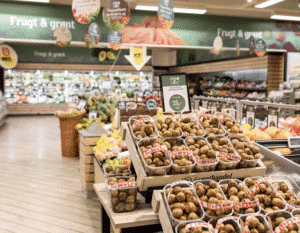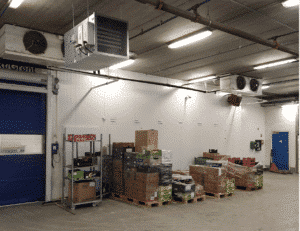STOP food waste in the Fruit and Vegetable storage facility – an inexpensive and simple solution
General microbiological challenges in fruit and vegetable storage facilities
Ionisation can also be used in the lorry’s storage space when fruit and vegetables are transported on the last stretch to shops/consumers.
PROBLEM:
In Norway, several COOP storage facilities have ionisation in their fruit and vegetable departments. It has typically been installed after a storage facility discovers mould on the walls or finds extra mould on their fruit and vegetables, increasing waste. An attempt can be made to try and reduce the increased mould growth by increased cleaning, but since the mould is found in the air, it is difficult to eliminate.
SOLUTION:
RESULT:
Mould, ethylene and dust have been eliminated to such an extent that the recycled air in the fruit and vegetable storage facility no longer provides a breeding ground for microbiology in the air. This is shown by the fact that there is a longer time between the cleaning intervals, there is less wastage, and the indoor climate for warehouse employees is better. However, the amount of waste is slightly seasonal, but in general, the amount of discarded fruit and vegetables will be noticeably less with ionisation. The system paid for itself in a short time, and that was by only including saved cleaning. Reduced waste and better indoor climate were additional benefits.
That ionisation had a noticeable positive effect on the indoor climate meant that COOP subsequently installed ionisation in their existing ventilation system in the administration and office, customised and installed by FHS Scandinavia.
DO YOU HAVE A CHALLENGE?
Do you need help with your challenge? Fill out the form and we will contact you as soon as possible
FHS SCANDINAVIA



